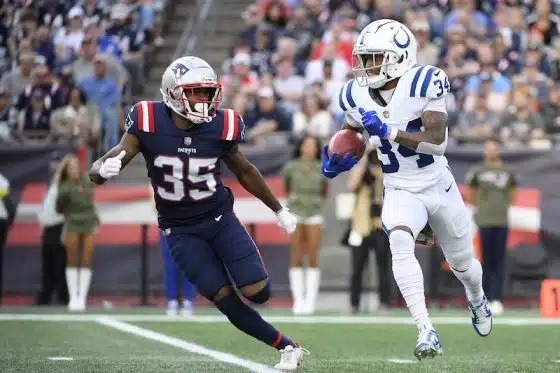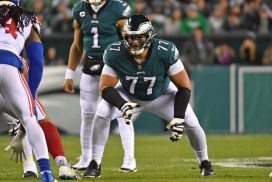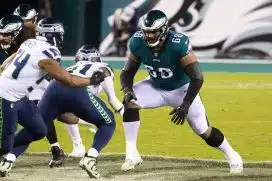By Tim Kelly, Sports Talk Philly editor
Just over five years removed from Junior Seau's tragic death, the most talked about story during the first week of NFL Training Camp wasn't the 2017 season. It was a discussion about the effects that the 1987, 1997 and 2007 seasons had, are having and will have on former NFL players.
Last Tuesday, the Journal of American Medical Association published perhaps the most damning study about the effects that playing in the NFL has on player's brains. The most noteworthy finding in the study was that of the 111 brains of decesased NFL players, 110 of them had CTE.
After reading the full study, I was left with one perplexing thought: will we always be OK with the detrimental effects that playing in the NFL has on the brains of former NFL players?
It's simple enough to get out of feeling any moral responsibility by saying that virtually anyone who is a fan of the sport currently didn't grasp the traumatic effects that the sport had when they started watching it. Little to no research was available to the public 15 years ago.
Trending: Former Villanova Linebacker Don Cherry Taking Charge for Eagles
The problem with that theory is that potential out is that most people start watching the sport at a young age. A nine-year-old, whether that information is available or not, probably won't find it and won't understand much of it even if they do. So it's not that simple.
Essentially, three groups will form. There will be a small portion of people who altogether stop watching the sport because of studies like this. There will be those who continue to watch without feeling any sense of guilt, choosing to cite that players now are fully aware of the risk that playing the sport will have on them in the long-run and are taking a calculated risk. The third group, which I probably fall in, will continue watching the sport, but do so while having to silence the conscience in the back of their head.
It's funny, a relative told me prior to last season that she was going to stop watching the sport because of the traumatic effects that it had on players. My initial reaction was to scoff, although I knew that everything she cited was substantive.
Because of my love of the sport, I instead chose to bury my head in the sand. It isn't wrong to say that today's players understand the risks associated with playing in the NFL. But until you are suffering from CTE, you can't truly grasp the type of gamble you are making.
There's no amount of money that can make it go away. Your family's love can't make your head or sunlight hurt less. The fame and memories you acquired while playing the sport don't matter when you struggle to remember them.
If that feels cold, sorry. That's the reality facing players in the NFL. And as this study showed, it's not a minority of people who play in the league that are affected by CTE. It's true, this study is flawed in the sense that you can only test for CTE after a player has passed away. Do 99 percent of former NFL players living struggle with CTE? No, but this study suggests that a much larger percentage than we previously thought do, and some of those who don’t will probably develop it.
I left the first game of the 2016 NFL season between the Carolina Panthers and Denver Broncos with a very different feeling than I normally do after season openers. I watched the beating that the league's reigning MVP, Cam Newton, took to his head. It was only seven months prior that I marvelled at the pace that Von Miller and DeMarcus Ware were able to get to Newton and lay hard hits on him in. But with another offseason full of debate about how the NFL should address its concussion issue, this game left me worried about the long-term health of Newton.
Popular on SportsTalkPhilly.com: Flyers Slated for 16 Nationally Televised Games in 2017-18
Perhaps I'm digging too deeply into this. But as someone who has had two concussions, I can't help but worry about the future effects that the game of football will have on Newton, Wes Welker and stars who have taken a ton of hits to the head throughout their careers. These players have provided the country with years' worth of entertainment. They provide people like me with jobs writing about their sport. To just enjoy them while they play in the NFL and pretend like the rest of their lives don't happen is a pretty evil thing.
I've often wondered if I would trade lives with Muhammad Ali. Ali is probably the greatest boxer of all-time, a civil rights icon and probably one of the 100 most recognizable people to ever walk the earth. And yet, being hit in the head for a living at the very least increased his chances of getting Parkinson's syndrome. Doctors told Ali in 1984, when he was just 45 years old, that he had developed Parkinson's syndrome. 12 years later, Ali lit the torch at the 1996 Atlanta Olympics, clearly struggling with the effects of Parkinson's syndrome. It's considered an iconic moment in Olympic history, but to me, it's sad in a way. Over the remaining years of Ali's life, his Parkinson's got even worse. He lived 20 more years with Parkinson's syndrome after that torch lighting. None of this is meant in any way to diminish the life that Ali lived, but I can't imagine living more than three decades with the type of struggles that Ali did. Despite the tremendous impact his life had, I wouldn't even think of trading lives with him.
But you always kind of knew that boxing would lead to these type of awful effects for many of the competitors later in life. What this study shows, however, is that the effects of playing football aren't drastically different.
The median age of death for former players examined in this study (this includes those who played in the CFL, those who played in other professional leagues, those who played in high school and college and those who played just in high school) is 66. The United States Social Security administration says that the average man who lives to be 65 can be expected to live to be 84.3 years old, so that obviously is alarming.
Perhaps what's more alarming than the lowered life expectancy is the quality of life, or seemingly lack thereof. 110 of the 111 former NFL player's brains examined showed signs of CTE. Of those 110, 95 had 'severe CTE,' according to the study.
The study is as damning as it gets. And yet, I'm hypocritical. While I worry about the effects that playing on the defensive line into their late-30s will eventually have on James Harrison and Julius Peppers, I'll be at the television this fall enjoying their dominant play with millions of other Americans.
I'm not sure how much longer I'll be able to bury my head in the sand, though. I'll probably never stop watching the sport, but like many others, the conscience in the back of my head may continue to grow louder to the point that I don't enjoy it the way I once did.
Studies like this remind me of the dark feeling I was left with after Seau's death. Watching his mother cry on television, it was apparent he had a family that deeply loved him. Playing 20 years in the NFL didn't leave him short on money or fans that worshiped him. But in the end, the damage from playing football made him, at age 43, feel desperately lonely. I don't know what the answer to this question is, but I wonder, now more than ever, if we'll always be as cool with rushing to our televisions on Sunday to watch a league that statistically seems to be an early (and painful) death sentence for a large percentage of its participants.







